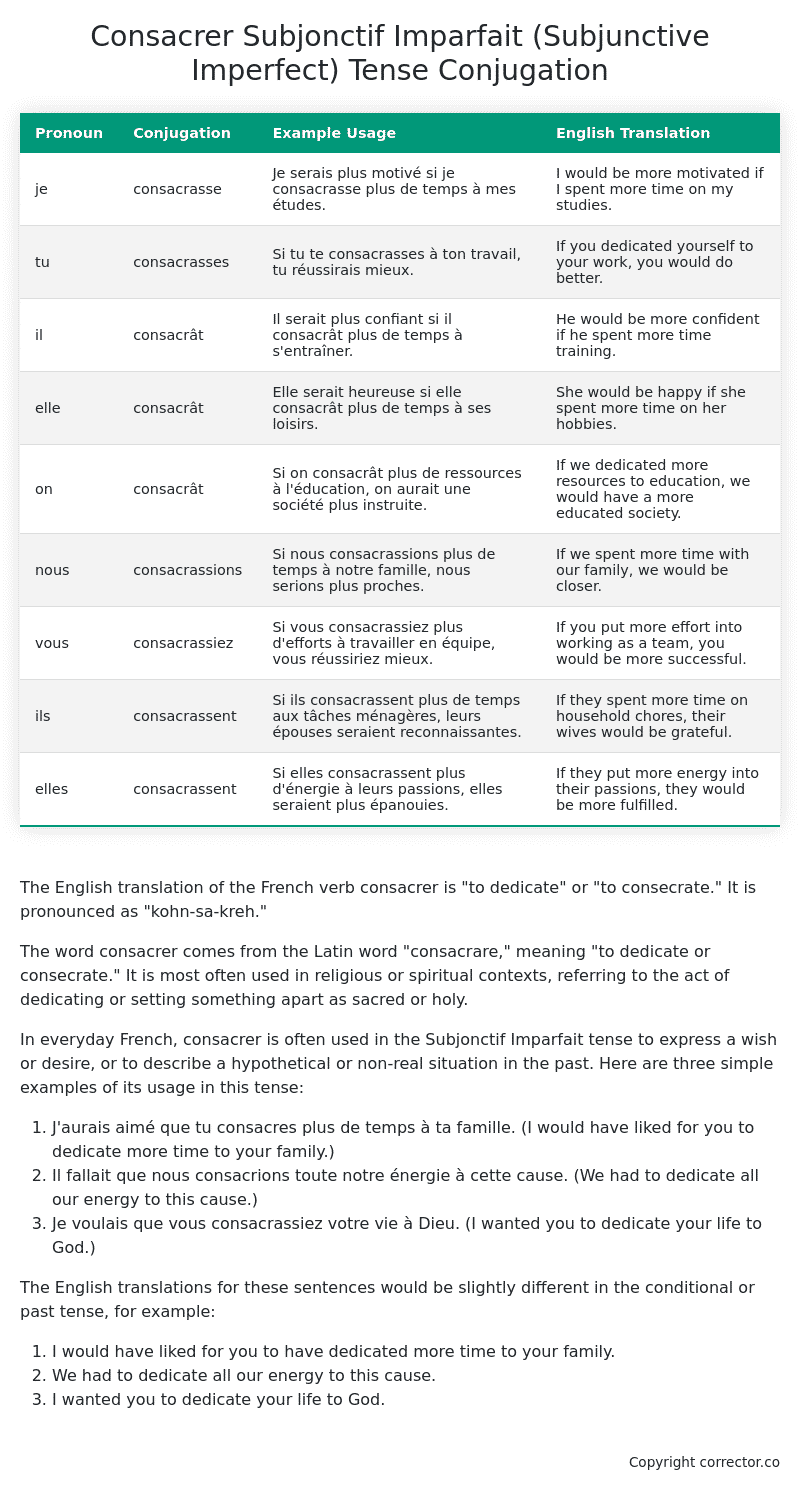Subjonctif Imparfait (Subjunctive Imperfect) Tense Conjugation of the French Verb consacrer
Introduction to the verb consacrer
The English translation of the French verb consacrer is “to dedicate” or “to consecrate.” It is pronounced as “kohn-sa-kreh.”
The word consacrer comes from the Latin word “consacrare,” meaning “to dedicate or consecrate.” It is most often used in religious or spiritual contexts, referring to the act of dedicating or setting something apart as sacred or holy.
In everyday French, consacrer is often used in the Subjonctif Imparfait tense to express a wish or desire, or to describe a hypothetical or non-real situation in the past. Here are three simple examples of its usage in this tense:
- J’aurais aimé que tu consacres plus de temps à ta famille. (I would have liked for you to dedicate more time to your family.)
- Il fallait que nous consacrions toute notre énergie à cette cause. (We had to dedicate all our energy to this cause.)
- Je voulais que vous consacrassiez votre vie à Dieu. (I wanted you to dedicate your life to God.)
The English translations for these sentences would be slightly different in the conditional or past tense, for example:
- I would have liked for you to have dedicated more time to your family.
- We had to dedicate all our energy to this cause.
- I wanted you to dedicate your life to God.
Table of the Subjonctif Imparfait (Subjunctive Imperfect) Tense Conjugation of consacrer
| Pronoun | Conjugation | Example Usage | English Translation |
|---|---|---|---|
| je | consacrasse | Je serais plus motivé si je consacrasse plus de temps à mes études. | I would be more motivated if I spent more time on my studies. |
| tu | consacrasses | Si tu te consacrasses à ton travail, tu réussirais mieux. | If you dedicated yourself to your work, you would do better. |
| il | consacrât | Il serait plus confiant si il consacrât plus de temps à s’entraîner. | He would be more confident if he spent more time training. |
| elle | consacrât | Elle serait heureuse si elle consacrât plus de temps à ses loisirs. | She would be happy if she spent more time on her hobbies. |
| on | consacrât | Si on consacrât plus de ressources à l’éducation, on aurait une société plus instruite. | If we dedicated more resources to education, we would have a more educated society. |
| nous | consacrassions | Si nous consacrassions plus de temps à notre famille, nous serions plus proches. | If we spent more time with our family, we would be closer. |
| vous | consacrassiez | Si vous consacrassiez plus d’efforts à travailler en équipe, vous réussiriez mieux. | If you put more effort into working as a team, you would be more successful. |
| ils | consacrassent | Si ils consacrassent plus de temps aux tâches ménagères, leurs épouses seraient reconnaissantes. | If they spent more time on household chores, their wives would be grateful. |
| elles | consacrassent | Si elles consacrassent plus d’énergie à leurs passions, elles seraient plus épanouies. | If they put more energy into their passions, they would be more fulfilled. |
Other Conjugations for Consacrer.
Le Present (Present Tense) Conjugation of the French Verb consacrer
Imparfait (Imperfect) Tense Conjugation of the French Verb consacrer
Passé Simple (Simple Past) Tense Conjugation of the French Verb consacrer
Passé Composé (Present Perfect) Tense Conjugation of the French Verb consacrer
Futur Simple (Simple Future) Tense Conjugation of the French Verb consacrer
Futur Proche (Near Future) Tense Conjugation of the French Verb consacrer
Plus-que-parfait (Pluperfect) Tense Conjugation of the French Verb consacrer
Passé Antérieur (Past Anterior) Tense Conjugation of the French Verb consacrer
Futur Antérieur (Future Anterior) Tense Conjugation of the French Verb consacrer
Subjonctif Présent (Subjunctive Present) Tense Conjugation of the French Verb consacrer
Subjonctif Passé (Subjunctive Past) Tense Conjugation of the French Verb consacrer
Subjonctif Imparfait (Subjunctive Imperfect) Tense Conjugation of the French Verb consacrer (this article)
Subjonctif Plus-que-parfait (Subjunctive Pluperfect) Tense Conjugation of the French Verb consacrer
Conditionnel Présent (Conditional Present) Tense Conjugation of the French Verb consacrer
Conditionnel Passé (Conditional Past) Tense Conjugation of the French Verb consacrer
L’impératif Présent (Imperative Present) Tense Conjugation of the French Verb consacrer
L’infinitif Présent (Infinitive Present) Tense Conjugation of the French Verb consacrer
Struggling with French verbs or the language in general? Why not use our free French Grammar Checker – no registration required!
Get a FREE Download Study Sheet of this Conjugation 🔥
Simply right click the image below, click “save image” and get your free reference for the consacrer Subjonctif Imparfait tense conjugation!

Consacrer – About the French Subjonctif Imparfait (Subjunctive Imperfect) Tense
Formation
Common Everyday Usage Patterns
Interactions with Other Tenses
Subjonctif Présent
Indicatif Passé Composé
Conditional
Conditional Perfect
Summary
I hope you enjoyed this article on the verb consacrer. Still in a learning mood? Check out another TOTALLY random French verb conjugation!


